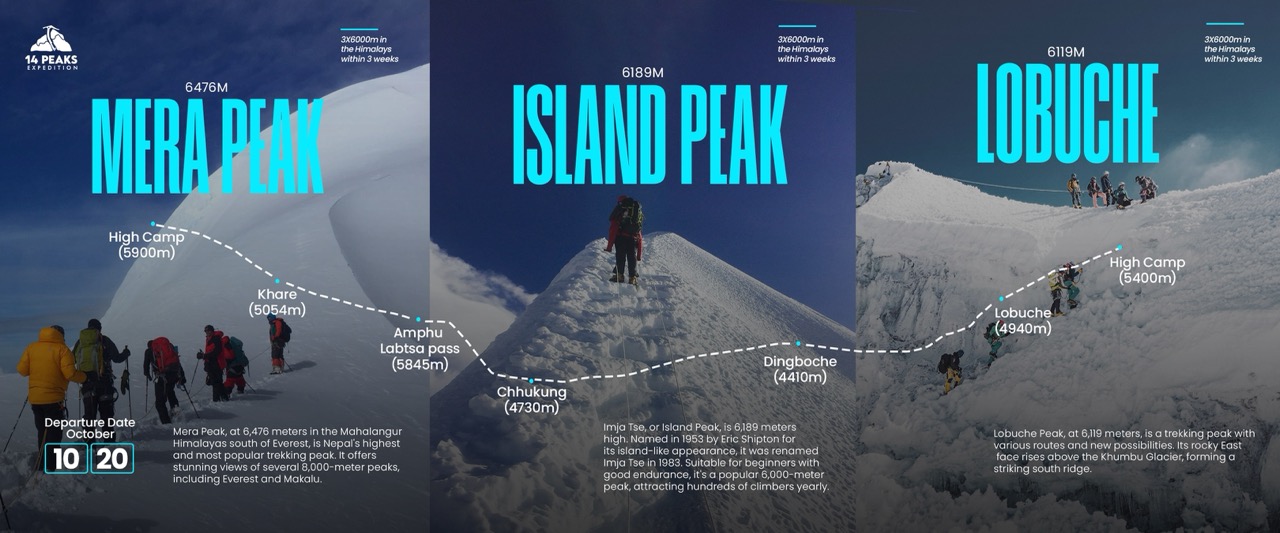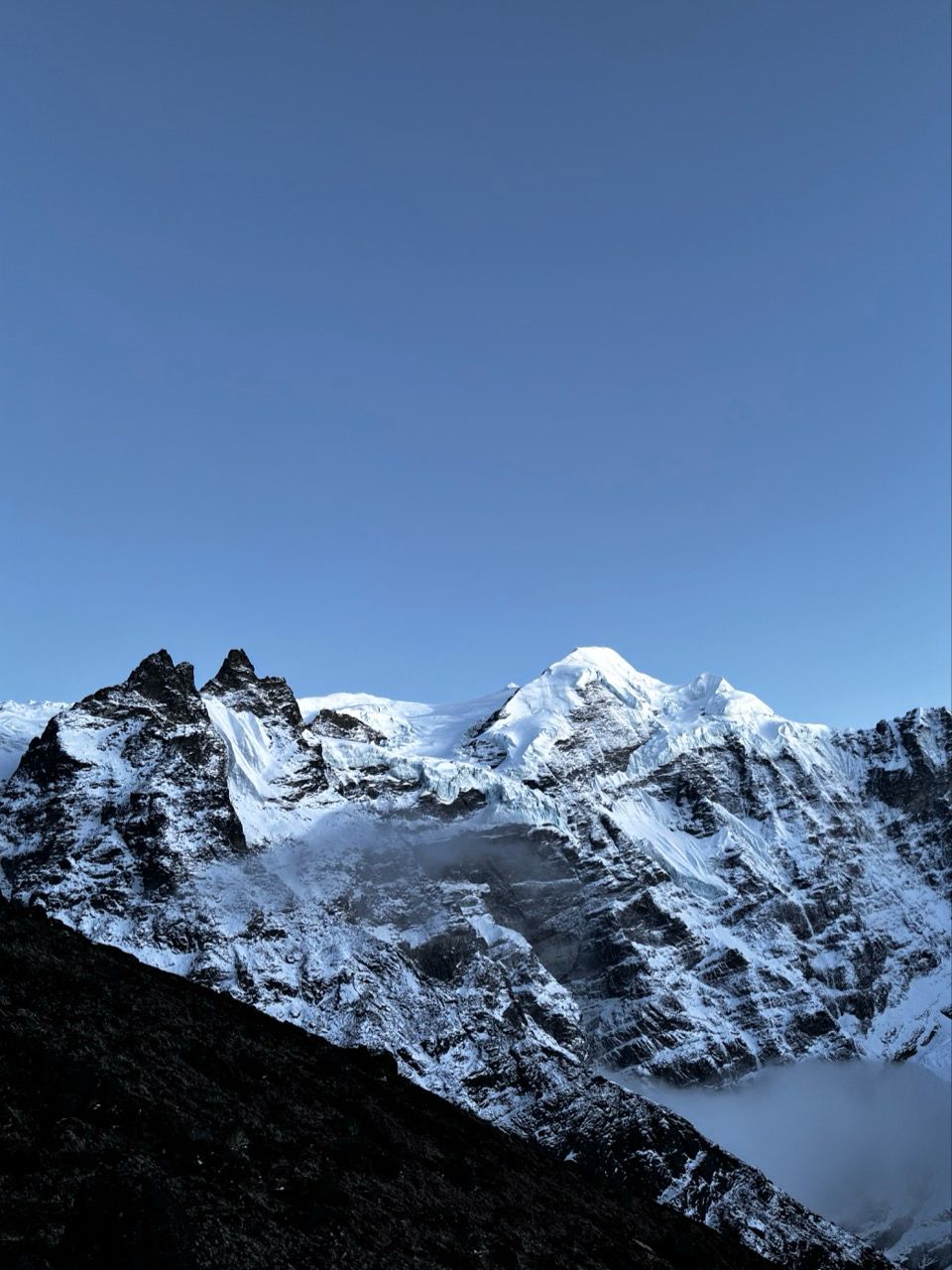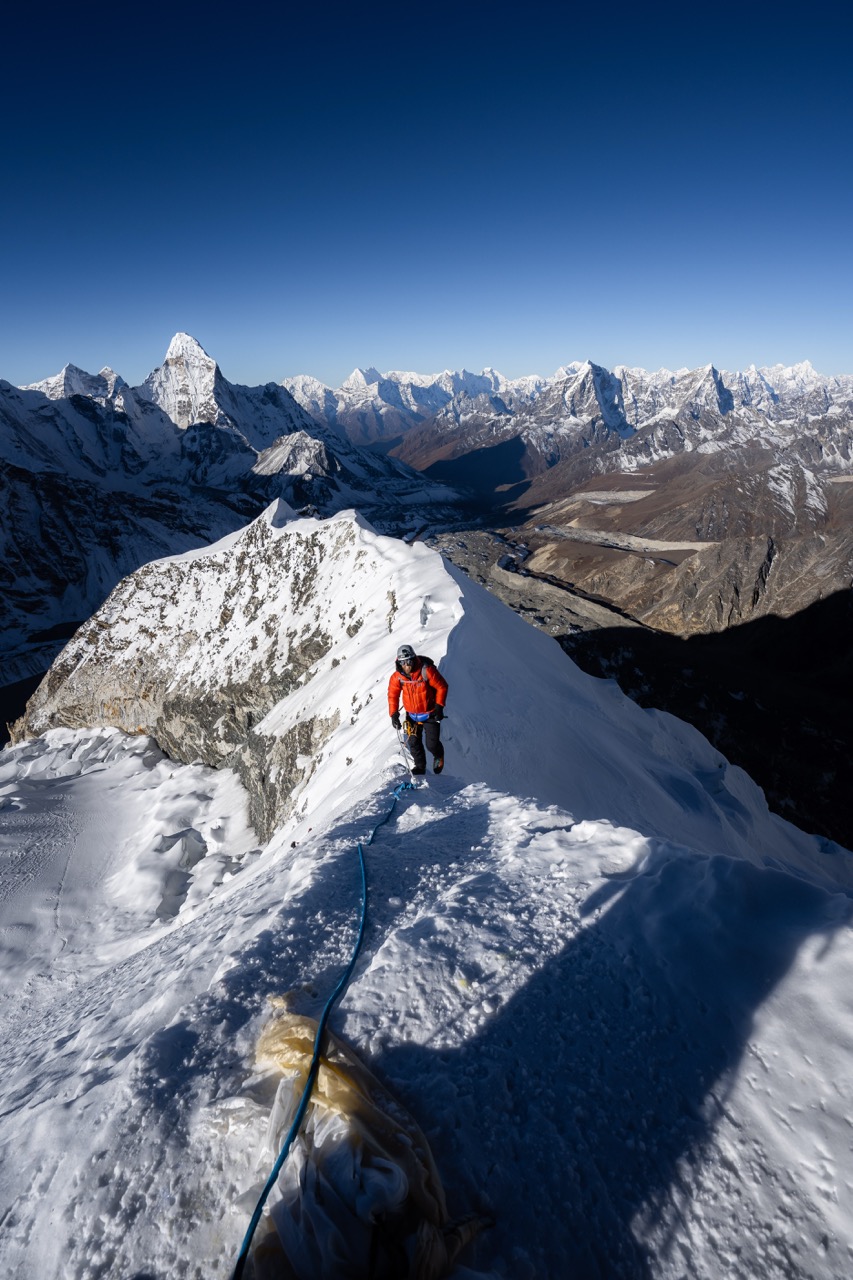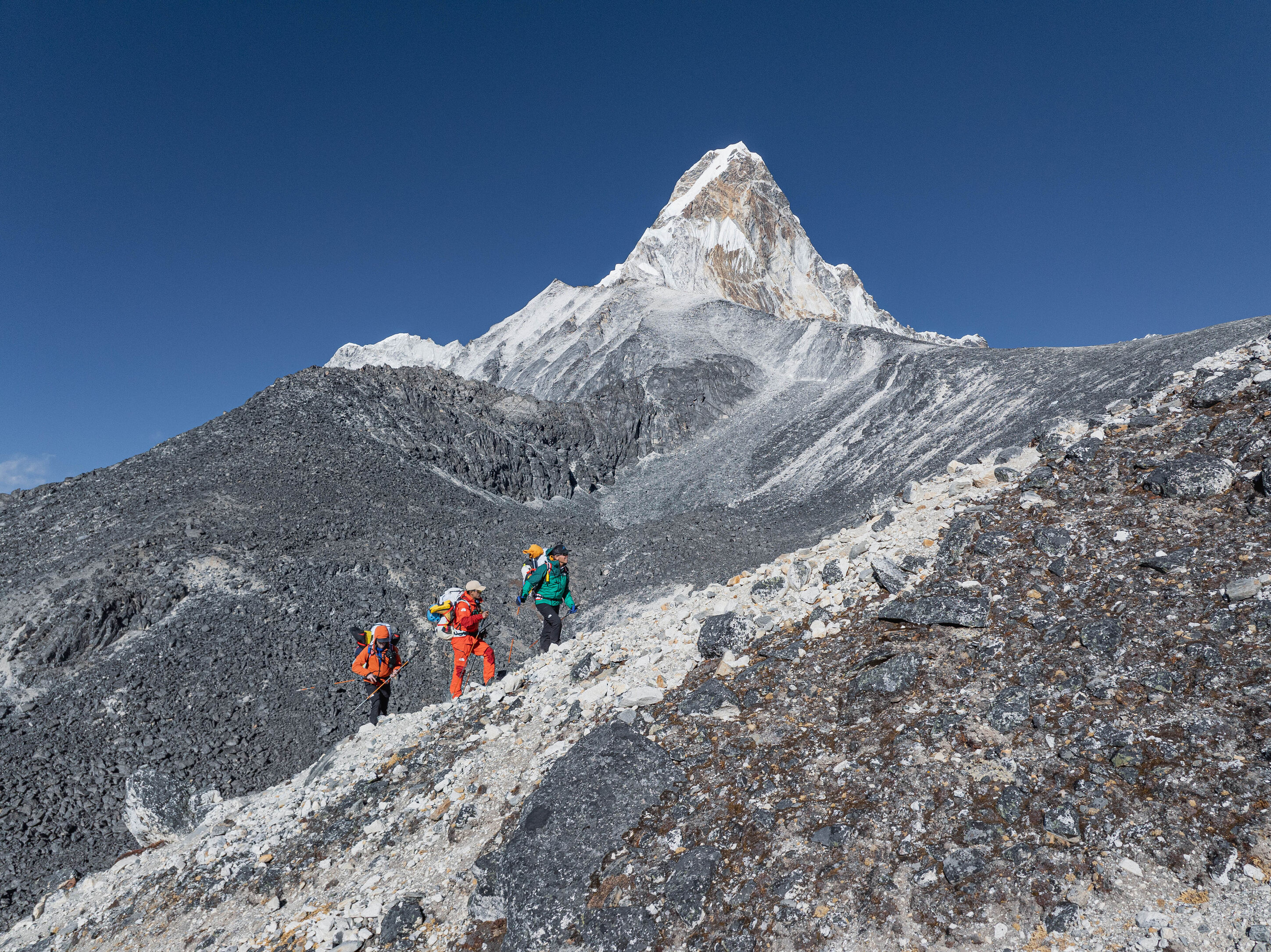
3 X 6000M PEAKS CLIMBING IN KHUMBU REGION
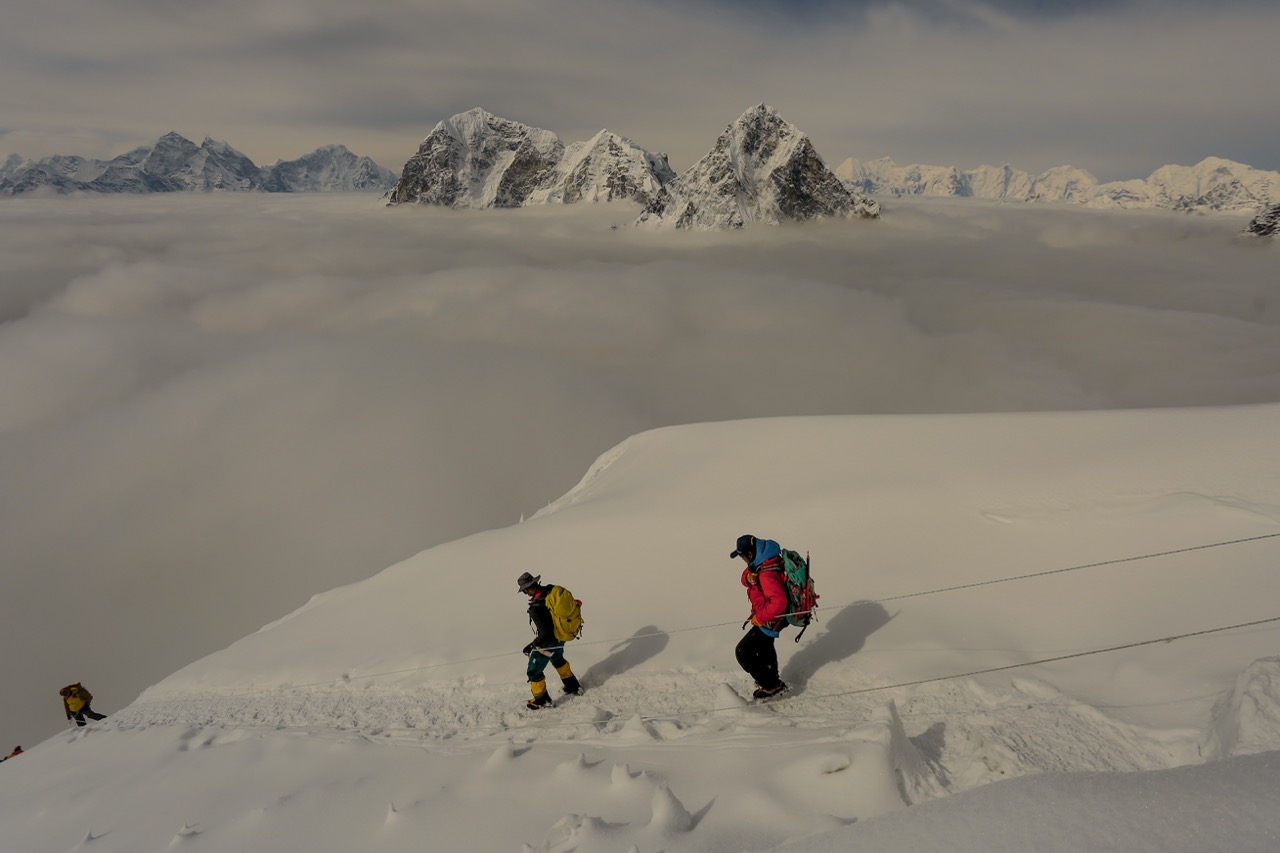

Three peaks climb in Nepal offers an excellent introduction to real Himalayan mountaineering by climbing three iconic six thousand-meter peaks in a single trip.
Mera Peak elevates 6,476m above sea level in the Mahalangur section of the Himalayas, south of Mount Everest. Categorized as the trekking peaks, it is one of the most popular in its category. Mera Peak is the highest trekking peak in Nepal. The summit offers some exquisite views of 8000m peaks namely, Mt. Everest, Makalu, Lhotse, Cho Oyo, Kanchenjunga, and several other peaks. Spring and autumn seasons are the best time to trek this mountain.
Imja Tse peak or also popularly known as Island Peak, stands tall with a modest height of 6,189m. English Mountaineer Eric Shipton named it an Island Peak in 1953. He thought it resembled an island in a sea of ice seeing it from Dingboche. In 1983, Island Peak again got its new name, Imja Tse. With very few technical aspects, it offers itself even to beginner climbers with competitive endurance. Hence, it is one of the most popular choices among the 6000m. Island Peak welcomes hundreds of climbers' groups each year luring them to their peak.
The Lobuche peak consists of two different summits, via. East and West with heights of 6,119 m and 6,145 m respectively. A continuous ridge connects them but there is still a sharp gap and a considerable distance between them. The East Peak is recognized as a trekking peak, whereas the West is known as an Expedition Peak. Lobuche, being an attractive mountain offers various existing routes and also a potential for new ones. The dark triangle of its rocky East face rises over the moraines of the Khumbu Glacier to a spectacular skyline, forming the south ridge.

Airport Transfers: Private vehicle for airport-hotel transfers (both pick-up and drop-off). Member Transportation: Helicopter flight from Kathmandu to Lukla and return from Lobuche High Camp to Kathmandu, as per itinerary. Expedition Equipment Transportation: Kathmandu to Lukla (by air cargo). Lukla to Base Camp (by porters/yaks). Return from Base Camp to Lukla (by porters/yaks). Lukla to Kathmandu (by air cargo). Member Luggage: Up to 25 kg per member as personal baggage during the trek, carried by porters.
Kathmandu Hotel: Three nights in a single room at a five-star hotel on a bed and breakfast plan. Trek and Base Camp Lodging: Accommodation at hotels/lodges during the trek and at Base Camp with a well-managed setup. High Camp Accommodation: Single tent per member in high camps.
Three meals a day (breakfast, lunch, and dinner), including tea and coffee. Fresh vegetables, meat, fruits, and soft drinks served throughout the expedition. Two liters of boiled water per member per day to carry in a thermos.
Expedition royalty and permit fees from the Nepal Mountaineering Association (NMA) for: Mera Peak Island Peak Lobuche Peak Entry permits for: Sagarmatha National Park Pasang Lhamu Rural Municipality Garbage management fees (stool shipment transfer and garbage deposit fees).
Salaries, daily wages, food, clothing, and equipment for: Nepalese staff Porters Highly skilled and experienced climbing Sherpa per member (1:1 ratio) from Base Camp to summit and back. Porters per member up to Base Camp and back. Climbing Sherpa assistance for carrying gear to high camps.
One 14 Peaks Expedition duffle bag (150L) per member. High-altitude camp setup including: High-altitude tents Lights Cooking equipment (EPI gas, cooking pot) High-altitude food for members, Sherpas, and crew Group climbing gear Fixed and dynamic ropes as required
One oxygen bottle per member. One set of summit oxygen mask and regulator carried by Sherpa throughout the expedition. Comprehensive medical kits for members and staff. Regular weather forecast reports from Meteotest, Bern (Switzerland).
Medical and emergency rescue insurance for all Nepalese staff involved in the trek and expedition.
Welcome Dinner: One welcome dinner at a tourist-standard restaurant in Kathmandu with office staff. Valley Sightseeing: Sightseeing in Kathmandu Valley, including: Swoyambhu (Monkey Temple) Pashupatinath Boudhanath
Three Peaks climbing certificate issued by NMA after successfully climbing all three peaks.
International Flights: Airfare to and from Kathmandu. Nepal Entry Visa Fees: $30 USD for 15 days $50 USD for 30 days $125 USD for 90 days
Meals in Kathmandu: Lunch and dinner during the stay in Kathmandu (also applicable in case of early return from the trekking/expedition). Extra Nights in Kathmandu: Additional accommodation costs due to: Early arrival Late departure Early return from trekking/expedition Domestic flight cancellations
Mandatory Insurance Policy: Coverage must include: Medical and high-altitude evacuation costs Trip cancellation and interruption High-altitude rescue and air evacuation Medical treatment and repatriation (A copy of the insurance policy must be sent before arrival.)
Costs for: Telephone calls Internet usage Toiletries Battery recharges Hot showers Laundry Soft drinks, beers, and alcoholic beverages (during the trek and in Kathmandu) (Soft drinks will be provided at base camp, but not elsewhere.)
Personal Climbing Equipment: Clothing, packing items, bags, personal medical kits, and all types of personal trekking/climbing gear. Filming Permits: Fees for special filming, camera, and drone permits. Internet Service: Not included during the trek and expedition.
Summit Bonus for Climbing Sherpa: Minimum of $600 USD ($200 per peak). Tips for Staff: Base Camp and High Camp Staff – Minimum $250 USD.
Any other services or activities not mentioned in the itinerary and not listed in the "Cost Includes" section.

